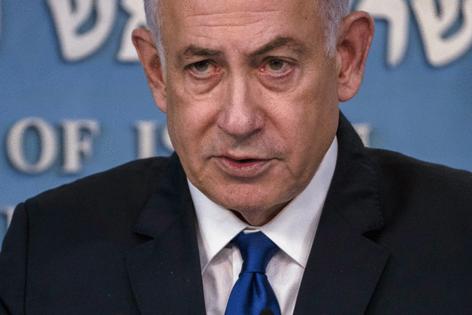Israel vows response to Iran as US and allies urge restraint
Published in News & Features
Top Israeli military officials reasserted that their country has no choice but to respond to Iran’s weekend drone and missile attack, even as European and U.S. officials boosted their calls for Israel to avoid a tit-for-tat escalation that could provoke a wider war.
“Missiles into the territory of the State of Israel will be met with a response,” Israel Defense Forces Chief of Staff Herzi Halevi said in a speech to troops at the Nevatim air base, which was targeted in Saturday night’s attack. He spoke in front of an F-35 fighter jet, the type of plane that Israel used to help repel the Iranian barrage and could play a role in an Israeli counterstrike.
The focus shifted to the timing and nature of the possible Israeli response. Prime Minister Benjamin Netanyahu must weigh his desire to strike back after Iran’s unprecedented direct attack against the pressure from President Joe Biden and other world leaders to hold back and keep the international scrutiny on Iran’s actions.
The West and Arab states are trying to convince Netanyahu that an aggressive reaction to Iran’s assault on Saturday night would harm Israel’s interests. They’re also concerned it could push up oil prices, hindering central banks’ attempts to slow inflation.
Iran fired more than 300 drones and missiles in its first-ever attack on Israel from its own soil. Almost all were intercepted by Israeli, U.S., U.K., French and some Arab forces. The projectiles caused minor damage, and only one person, a child, was reported injured.
Biden sought to return the focus to a proposed cease-fire agreement intended to pause Israel’s military campaign in the Gaza Strip in response to the Oct. 7 attack by Iranian-backed Hamas militants. Asked how soon Israel might respond to Iran’s weekend attack, National Security Council spokesman John Kirby said the U.S. doesn’t want to see a wider conflict and will help Israel defend itself.
“You’re asking me to get ahead of, as far as I know, a decision that the war cabinet hasn’t even made,” Kirby said of Israel’s deliberations.
French President Emmanuel Macron said in an interview with France’s BFM TV and RMC radio that “we’re going to do everything we can to avoid flare-ups, and try to convince Israel that we shouldn’t respond by escalating, but rather by isolating Iran.” German Chancellor Olaf Scholz made similar comments while visiting China, and both his foreign minister and that of the U.K. will travel to Israel later this week.
“We’re very anxious to avoid escalation and to say to our friends in Israel it’s a time to think with head as well as heart,” U.K. Foreign Secretary David Cameron said to Times Radio on Monday.
On Monday, Deputy Iranian Foreign Minister Ali Bagheri Kani vowed to counter any Israeli attack with a “more severe, faster and more immediate blow.” Kani, who served as Iran’s chief negotiator in nuclear talks, said in televised remarks that it would take “seconds” for his country to launch a retaliatory strike on Israel, comments that further fueled fears of an escalatory spiral.
...continued
©2024 Bloomberg L.P. Visit bloomberg.com. Distributed by Tribune Content Agency, LLC.







Comments